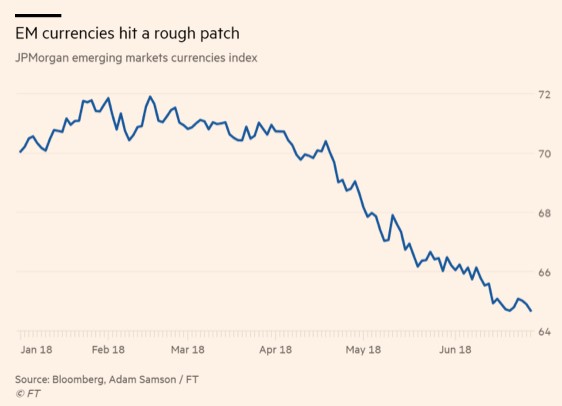Emerging market stocks have dropped three consecutive days as the bears take control and currencies take another hit, led by a very nervous Chinese yuan and prompting JPMorgan to say it thinks “we’re heading to an outright bear market”.
JPMorgan strategists have lowered their 12-month target for the MSCI emerging-markets gauge to 1,000 from 1,160, noting their concerns since the end of last year about how a softening in equities would play out for emerging markets.
On Wednesday, China’s main stock markets dropped over 2 percent and the yuan took another hit. China’s main stock markets have officially entered bear market territory, according to Reuters, seeing an overall 20-percent fall this week.
This is forebodes bad news for the broader Emerging Market, and indeed the entire developed market, because what happens in China reverberates far and wide. We’ve already seen this start to happen with the broader MSCI international EM index losing 8.8 percent in Q2. That’s knocking on the bear cave.
Cars stocks are in trouble, most notably in Europe and Japan, he said, while tech hardware, including semiconductors (chips) and mobile phones are expected to see a drop in earnings estimates.
Not only are U.S. protectionism and trade war tit-for-tats taking their toll, but global tightening is pushing interest-rate hikes at a faster clip than analysts initially anticipated.
JPMorgan’s emerging markets currencies barometer has dropped all week, down 0.61 percent from Friday and down 8.8 percent over Q2 2018.
China has seen its offshore yuan slide 5.3 percent in Q2.
The South African rand lost 1.1 percent Wednesday, while the Turkish lira lost 0.85 percent and India’s rupee fell 0.59 percent.

(Click to enlarge)
But there are some contrarians out there, advising investors to switch to emerging markets in what they’re calling a “perfect storm” brewing. With big-name investors lining up to call a major U.S. market correction because the strengthening of the U.S. dollar can be sustained long-term, emerging markets might look more alluring. Related: Ford Bets Billions On Detroit Comeback
“There’s a lot of positivity which is increasingly priced into the U.S. dollar … However, the U.S. totally depends on refinancing its deficits and depends on its relationship with China,” Mobius Capital partner Carlos Hardenberg told CNBC. “So the dollar from a longer-term perspective to me looks very fragile. So if you assume the strengthening of the U.S. dollar is not going to last for very long, that’s actually better news for emerging markets.”
Mobius also told Bloomberg that the Turkish lira is looking increasingly attractive, having lost 20 percent against the dollar so far this year.
Indeed, according to Bloomberg analysis, it might be best not to run for the hills from Emerging Markets. Even though they’ve lost 3.5 percent since Trump significantly escalated the trade war on June 18, the underperformance has been largely a Chinese equity story, while the rest of the MSCI Emerging Market Index has outperformed the S&P 500.

(Click to enlarge)
China, of course, is worried. Beijing attempted to calm the bar this week by having the central bank reduce the amount of reserves large commercial banks keep on deposit in order to open up $100 billion for the economy.
But its tech stocks are acting like bulldozers, and the rest of the emerging market index won’t be happy that their bringing the whole house down. After all, these massive tech stocks (think Alibaba, Baidu, Tencent) make up one-third of the index, and just these three make up one-tenth.
Related: The E-Commerce Giant Turned Lobbying Powerhouse
In the meantime, no one knows what to make of Trump’s trade ‘policy’, with contradictory statements coming out of Washington constantly.
A Treasury Department report on U.S. trade policy is expected to be out this week, and investors are worried. But in order to calm the market, Peter Navarro, White House trade adviser just came out with a statement clearly intended to ease fears, saying that restrictions on foreign investment might not be as strict as everyone’s expecting.
With the Dow having lost more than 400 points, Navarro jumped in to say (pardon the grammar): “There’s no plans to impose investment restrictions on any countries that are interfering in any way with our country. This is not the plan.”
It was a vague statement that no one has been able to successfully interpret, and there is no sign yet that it has done anything to calm markets. It could also easily be followed by another Trump tirade on Twitter, and the markets are on to this game by now.
By Charles Benavidez for Safehaven.com
More Top Reads From Safehaven.com:
















